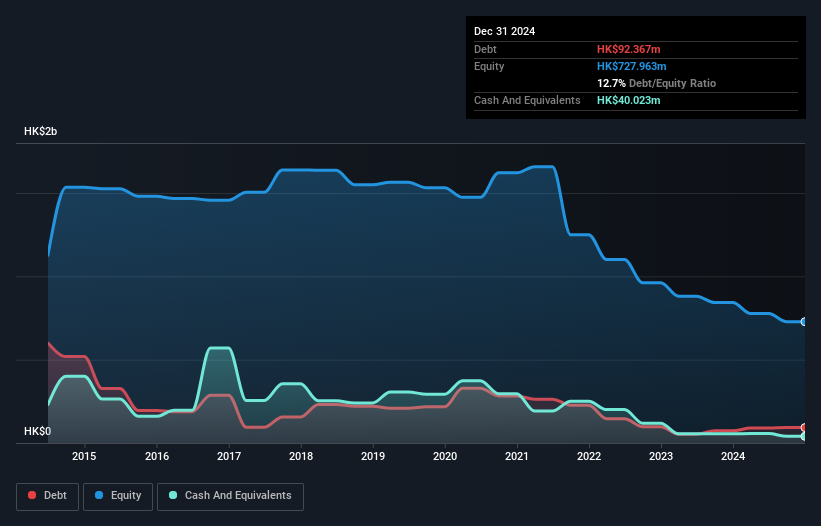
Howard Marks put it nicely when he said that, rather than worrying about share price volatility, 'The possibility of permanent loss is the risk I worry about... and every practical investor I know worries about.' When we think about how risky a company is, we always like to look at its use of debt, since debt overload can lead to ruin. We note that Hop Fung Group Holdings Limited (HKG:2320) does have debt on its balance sheet. But should shareholders be worried about its use of debt?
Our free stock report includes 2 warning signs investors should be aware of before investing in Hop Fung Group Holdings. Read for free now.When Is Debt Dangerous?
Debt and other liabilities become risky for a business when it cannot easily fulfill those obligations, either with free cash flow or by raising capital at an attractive price. Ultimately, if the company can't fulfill its legal obligations to repay debt, shareholders could walk away with nothing. However, a more frequent (but still costly) occurrence is where a company must issue shares at bargain-basement prices, permanently diluting shareholders, just to shore up its balance sheet. Of course, the upside of debt is that it often represents cheap capital, especially when it replaces dilution in a company with the ability to reinvest at high rates of return. The first thing to do when considering how much debt a business uses is to look at its cash and debt together.
What Is Hop Fung Group Holdings's Debt?
You can click the graphic below for the historical numbers, but it shows that as of December 2024 Hop Fung Group Holdings had HK$92.4m of debt, an increase on HK$72.8m, over one year. However, it also had HK$40.0m in cash, and so its net debt is HK$52.3m.

How Healthy Is Hop Fung Group Holdings' Balance Sheet?
We can see from the most recent balance sheet that Hop Fung Group Holdings had liabilities of HK$83.3m falling due within a year, and liabilities of HK$97.1m due beyond that. On the other hand, it had cash of HK$40.0m and HK$31.7m worth of receivables due within a year. So its liabilities outweigh the sum of its cash and (near-term) receivables by HK$108.7m.
When you consider that this deficiency exceeds the company's HK$73.6m market capitalization, you might well be inclined to review the balance sheet intently. In the scenario where the company had to clean up its balance sheet quickly, it seems likely shareholders would suffer extensive dilution. There's no doubt that we learn most about debt from the balance sheet. But it is Hop Fung Group Holdings's earnings that will influence how the balance sheet holds up in the future. So when considering debt, it's definitely worth looking at the earnings trend. Click here for an interactive snapshot.
View our latest analysis for Hop Fung Group Holdings
Over 12 months, Hop Fung Group Holdings made a loss at the EBIT level, and saw its revenue drop to HK$212m, which is a fall of 5.7%. That's not what we would hope to see.
Caveat Emptor
Importantly, Hop Fung Group Holdings had an earnings before interest and tax (EBIT) loss over the last year. Its EBIT loss was a whopping HK$90m. Considering that alongside the liabilities mentioned above make us nervous about the company. We'd want to see some strong near-term improvements before getting too interested in the stock. Not least because it had negative free cash flow of HK$29m over the last twelve months. That means it's on the risky side of things. When analysing debt levels, the balance sheet is the obvious place to start. However, not all investment risk resides within the balance sheet - far from it. We've identified 2 warning signs with Hop Fung Group Holdings , and understanding them should be part of your investment process.
If, after all that, you're more interested in a fast growing company with a rock-solid balance sheet, then check out our list of net cash growth stocks without delay.
Have feedback on this article? Concerned about the content? Get in touch with us directly. Alternatively, email editorial-team (at) simplywallst.com.
This article by Simply Wall St is general in nature. We provide commentary based on historical data and analyst forecasts only using an unbiased methodology and our articles are not intended to be financial advice. It does not constitute a recommendation to buy or sell any stock, and does not take account of your objectives, or your financial situation. We aim to bring you long-term focused analysis driven by fundamental data. Note that our analysis may not factor in the latest price-sensitive company announcements or qualitative material. Simply Wall St has no position in any stocks mentioned.